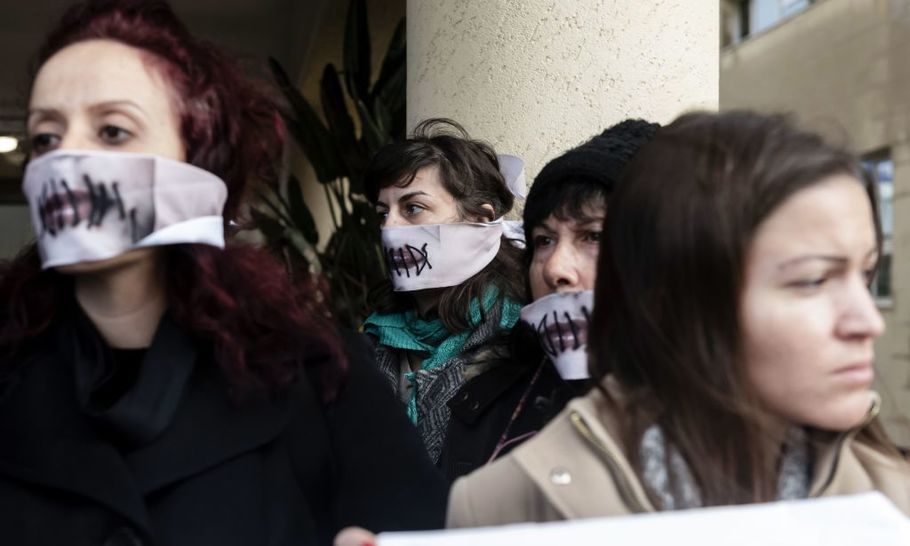Cyprus — where basic human rights have been forgotten

Protestors in Famagusta (IAKOVOS HATZISTAVROU/AFP via Getty)
Women’s groups are rallying around a British teenager, convicted in a Cyprus court of lying about being gang raped, calling her treatment “vindictive” and indicative of the “misogyny” prevalent within Cypriot culture.
Representatives from the Network of Women Against Gender Based Violence and the Cyprus Women’s Lobby, an umbrella group of 16 women’s organisations and non-governmental bodies, have been a supportive presence at Famagusta district court throughout the young woman’s trial.
A group of Israeli women are also said to be flying to the island in a gesture of solidarity as the British woman returns to court on Tuesday to be sentenced. They will join women’s rights groups planning to protest outside the court.
Zelia Gregoriou, from the Network Against Violence Against Women, said: “We knew it from July, when the accusation of rape came up, that the system would fail this woman. Every rape claim is treated pre-emptively as a false rape claim. It’s not the exception.”
Another rights campaigner, who asked not to be named, went even further: “I have never before seen the kind of vindictiveness that I have seen in this case,” she said.
“This young woman was such an easy target. Throughout this case, the dimension of human rights has been absent. That’s the message that needs to get out. There has been a lack of humanity. This woman is a human being who possibly made a mistake, but she certainly wasn’t served by the State in which that mistake was made.”
The 19-year-old woman’s ordeal began in July when she told police she had been raped by a group of Israeli youths in a hotel room in the popular holiday resort of Ayia Napa. Twelve males, aged between 15 and 22 years old, were remanded in custody, with five of them released without charge a week later when no DNA evidence linked them to the alleged crime.
Then, 10 days after reporting the rape, the British teenager was asked to return to the police station to give another statement. Following eight hours of “aggressive” interrogation — without a lawyer present — she signed a retraction and was formally charged with “giving a false statement over an imaginary offence”. The next day the remaining suspects were all released and immediately returned to Israel.
The case caused an outcry. Feelings have become so heated on the Mediterranean island that most of the local women activists interviewed about the case asked not to be named as the backlash has been so intense.
“We may have signed the Istanbul Convention that says victims of gender-based violence need some kind of support, but there remains a lot of work to be done. We’re a small group of women, we’re a small island and we have a lot of boys’ clubs here,” said one.
According to human rights campaigners, the treatment of the British woman is not an isolated incident. In the recent case of the island’s first serial killer, who murdered five woman and two girls, the police came in for heavy criticism for not taking the disappearance of the women seriously. The women were from the Philippines, Nepal and Romania and most worked as housekeepers.
“There is a level of misogyny within the community, but also a prioritised misogyny that distinguishes between migrant women, foreign women and local women. The lower you are on the scale, the worse it is,” said a women’s rights campaigner based in Nicosia.
“If, in the case of the serial killer, it had been Cypriot women who had gone missing it would have been handled very differently, but these migrant girls were almost erased before any investigation. It was assumed they had gone to the north or simply run away. In this latest case, the English girl is a foreigner. So, while misogyny comes into play, there’s also a ladder.”
Nicoletta Charalambidou, a Cyprus-based lawyer on the British woman’s defence team, said there is a problem within the system. “The whole sequence of the various authorities and the way they treat violence against women is problematic. It’s not a surprise that this case is treated in the same way and the same manner.”
In another damning blow to the reputation of the island, the mother of a young woman who also said she had been raped here 15 years ago, called in to a UK radio show following the guilty verdict to share her own daughter’s experience.
Speaking anonymously to Jeremy Vine on BBC Radio 2, the woman said that when the crime was reported, the police “decided it was my daughter who was lying”. They then held her in custody, allegedly telling her she could catch her flight home only if she retracted her statement. When she did, they arrested her for wasting police time.
The woman said the police had told her daughter that she would never win “because British girls only come here for one thing”.
The British teenager’s defence team have already said they will appeal the verdict, echoing concerns from rights campaigners that critical errors in the handling of the case made a fair trial all but impossible.
“There was a lack of process, a lack of humanity and a lack of human rights, even though violence was involved,” said another women’s rights activist. “Was there any way we could have got a ‘not guilty’ verdict considering that those arrested for rape were released within 10 days of being accused? How could they have come back with ‘not guilty’? What would they have done?”
“Today, this is not about who was telling the truth and who was lying. This is about process, and basic human rights that have been forgotten,” she said. “The process sucks, it has always sucked here, and this case has brought that out even stronger. The system has always failed people in Cyprus.”





